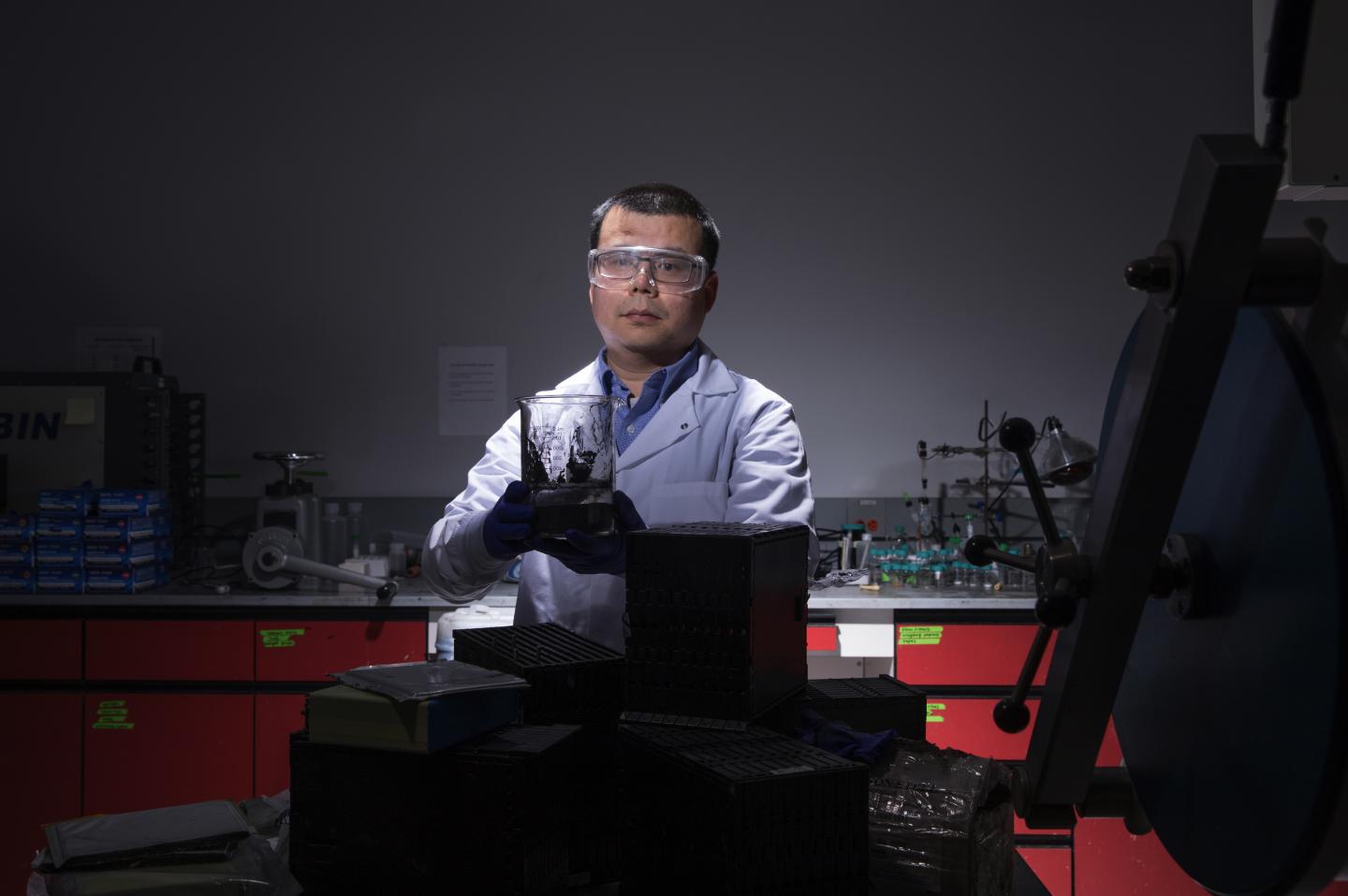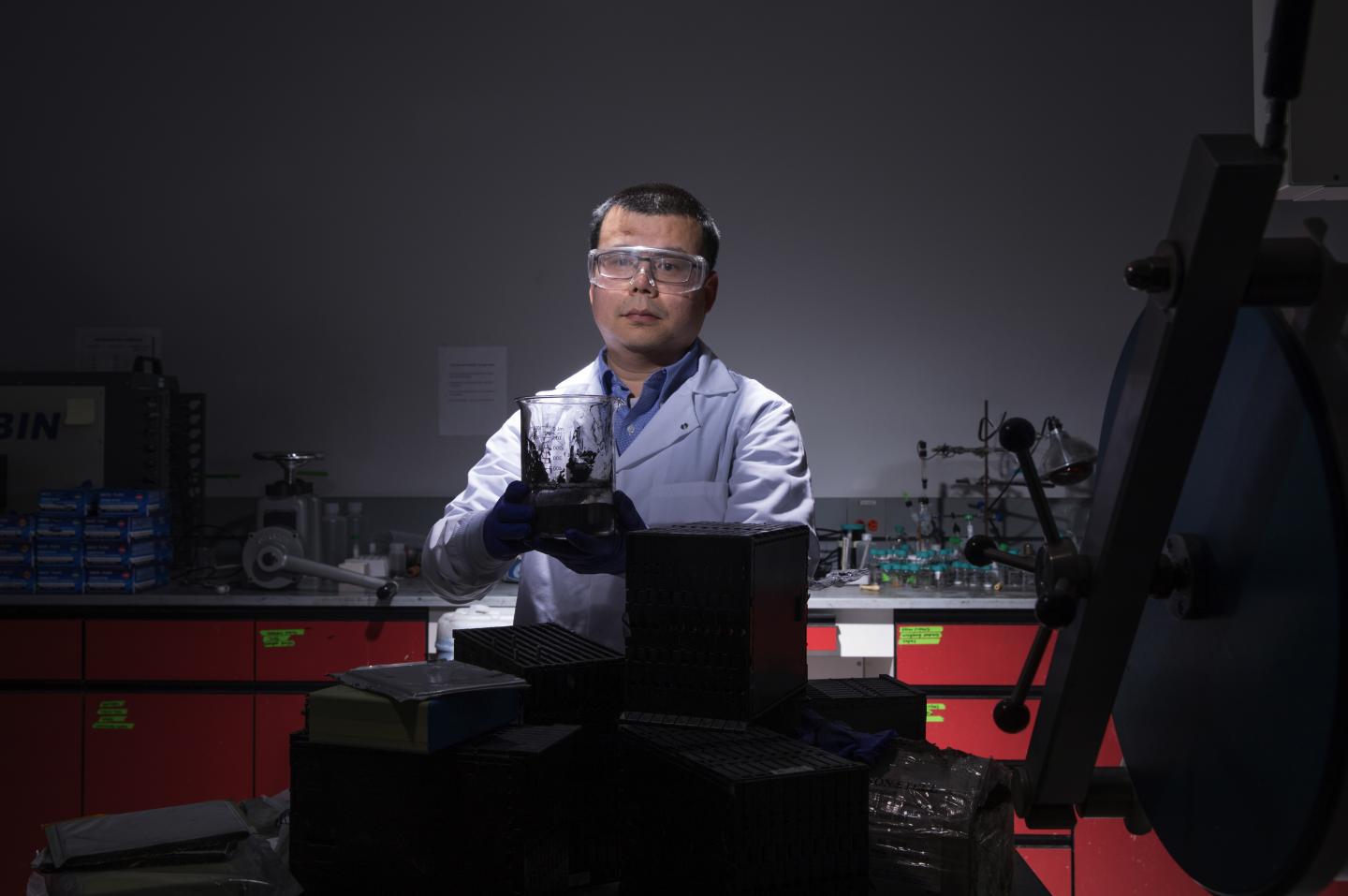
Credit: Worcester Polytechnic Institute
Worcester, Mass. – With a $1.08 million contract award from the United States Advanced Battery Consortium LLC (USABC), a collaborative organization of FCA US LLC, Ford Motor Company, and General Motors, a materials engineering research team at Worcester Polytechnic Institute (WPI) will extend development of its novel process to recycle spent lithium-ion (Li-ion) batteries and produce new cathode materials that are increasingly being adopted by automotive battery makers to reduce cost and increase energy density.
Building on a successful phase 1 (completed earlier this year), the contract award, which includes a 50 percent cost share, funds a 24-month phase 2 project. This contract will enable WPI to demonstrate the ability of its process to recycle spent Li-ion batteries and produce new cathode materials to generate a higher nickel cathode powder. This material is of increasing relevance in the current market shift towards higher nickel content.
The WPI team, led by Yan Wang, William Smith Foundation Dean's Associate Professor of Mechanical Engineering, has developed a patented closed-loop recycling process in which the batteries are first shredded. After the shredded materials are separated, the cathode powders are dissolved. By adjusting the chemistry of the solution, new materials, in the desired ratios, can be precipitated out as precursor and used to make cathode material for new batteries. Other materials recovered from the shredded batteries, including steel, graphite, and plastics, can also be recycled, thus benefiting the environment and improving the overall business model.
As part of the phase 1 USABC project, Wang took the process developed in his lab and proved that it can be scaled up to produce cathode materials that are equal in quality to those available commercially, and that those recovered materials can be used to make new vehicle batteries that are comparable to units sold by original equipment manufacturers (OEMs) for use in hybrid and electric vehicles.
The WPI recycling process was shown to be effective in recycling batteries that contain the most commonly used cathode materials at the time the research was completed to produce new cathode powders. But over the past few years, battery makers and car manufacturers have increasingly been moving towards higher nickel cathode formulations in efforts to reduce the quantity of cobalt contained in the cathode powders.
The switch to nickel is resulting in better batteries, as nickel-rich cathodes offer higher energy density (a greater ability to store energy) than cobalt-rich cathodes. But, Wang noted, producing nickel-rich cathodes is a more demanding process that requires additional steps not required for cobalt-rich cathodes. With the new USABC award, Wang and his team will seek to demonstrate their ability to produce high-quality nickel-rich cathode powders from materials recovered from recycled batteries, and that those cathode powders can be incorporated into batteries with electrochemical performance on par with OEM control units made with commercial powder. The team will also explore how different anode materials, including lithium, silicon, and titanium dioxide, as well as adhesives used in battery manufacture, affect the recycling process.
"I am quite confident that we can meet these targets," Wang said. "In the first phase of our USABC project we gained fundamental knowledge about how to control our process to produce cathode particles with the desired properties. While the conditions for forming cathode powders will be different with the high-nickel materials, our process is quite flexible and I believe it can be adapted to the new formulations."
As in the original USABC-funded project, the work of making and testing new automotive batteries using the high-nickel cathode powders produced by Wang's team will be subcontracted to A123 Systems and Battery Resourcers, a company that has licensed WPI's patented Li-ion battery recycling process.
"WPI is the first and only university to be granted an award from the USABC," Wang noted. "The consortium's funding usually goes to industry, because the focus is always on innovations that can be commercialized and used by the automotive industry. The USABC and the OEMs have been very helpful to us as we have worked to perfect and commercialize our process, because they see this as a viable solution to their growing end-of-life battery problem."
###
About Worcester Polytechnic Institute
WPI, a global leader in project-based learning, is a distinctive, top-tier technological university founded in 1865 on the principle that students learn most effectively by applying the theory learned in the classroom to the practice of solving real-world problems. Recognized by the National Academy of Engineering with the 2016 Bernard M. Gordon Prize for Innovation in Engineering and Technology Education, WPI's pioneering project-based curriculum engages undergraduates in solving important scientific, technological, and societal problems throughout their education and at more than 45 project centers around the world. WPI offers more than 50 bachelor's, master's, and doctoral degree programs across 14 academic departments in science, engineering, technology, business, the social sciences, and the humanities and arts. Its faculty and students pursue groundbreaking research to meet ongoing challenges in health and biotechnology; robotics and the internet of things; advanced materials and manufacturing; cyber, data, and security systems; learning science; and more. http://www.wpi.edu.
Media Contact
Andy Baron
[email protected]
508-831-5916
@WPI
http://www.wpi.edu
Original Source
https://www.wpi.edu/news/wpi-extend-novel-recycling-process-lithium-ion-batteries-108-million-award-us-advanced-battery





